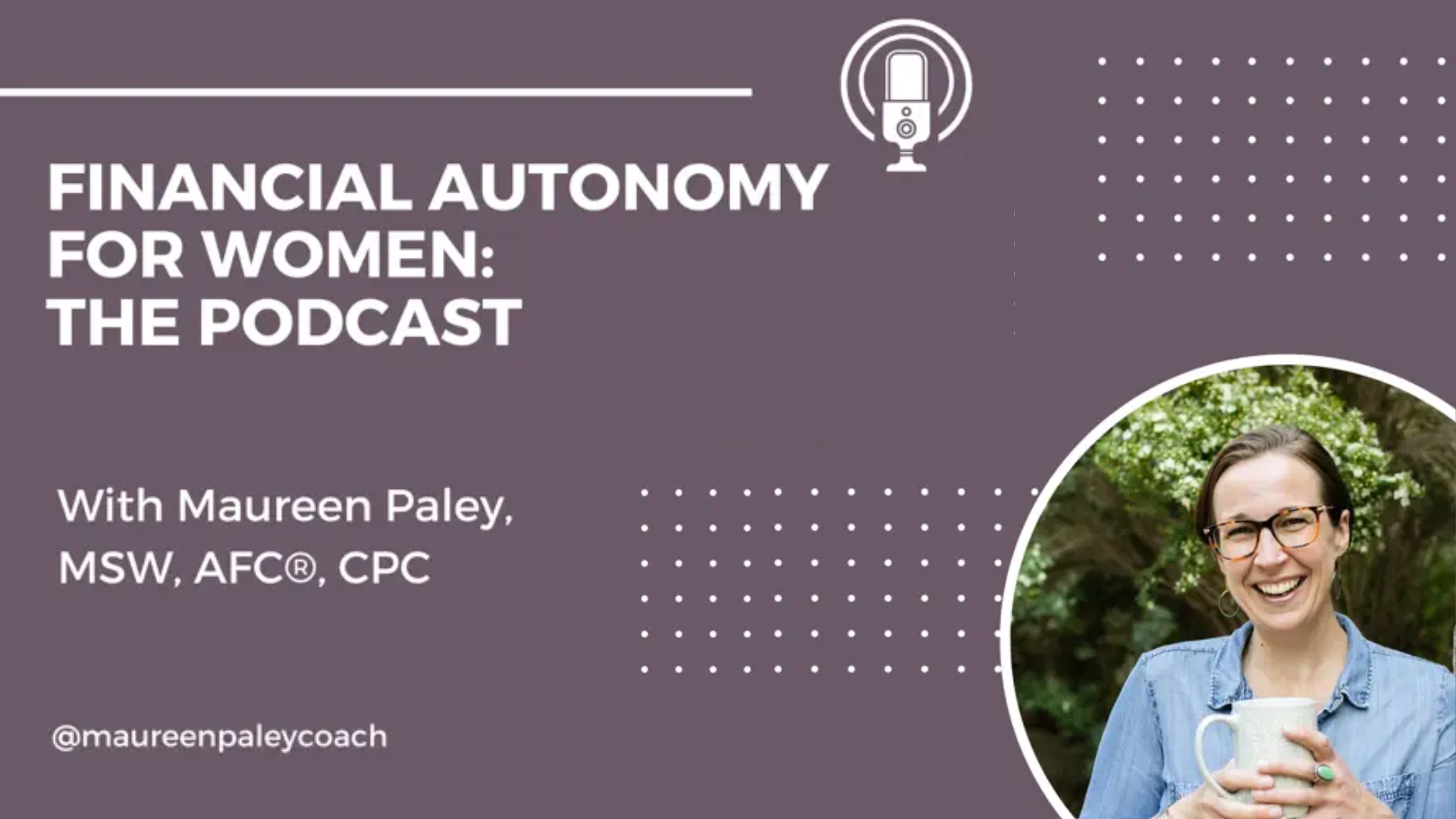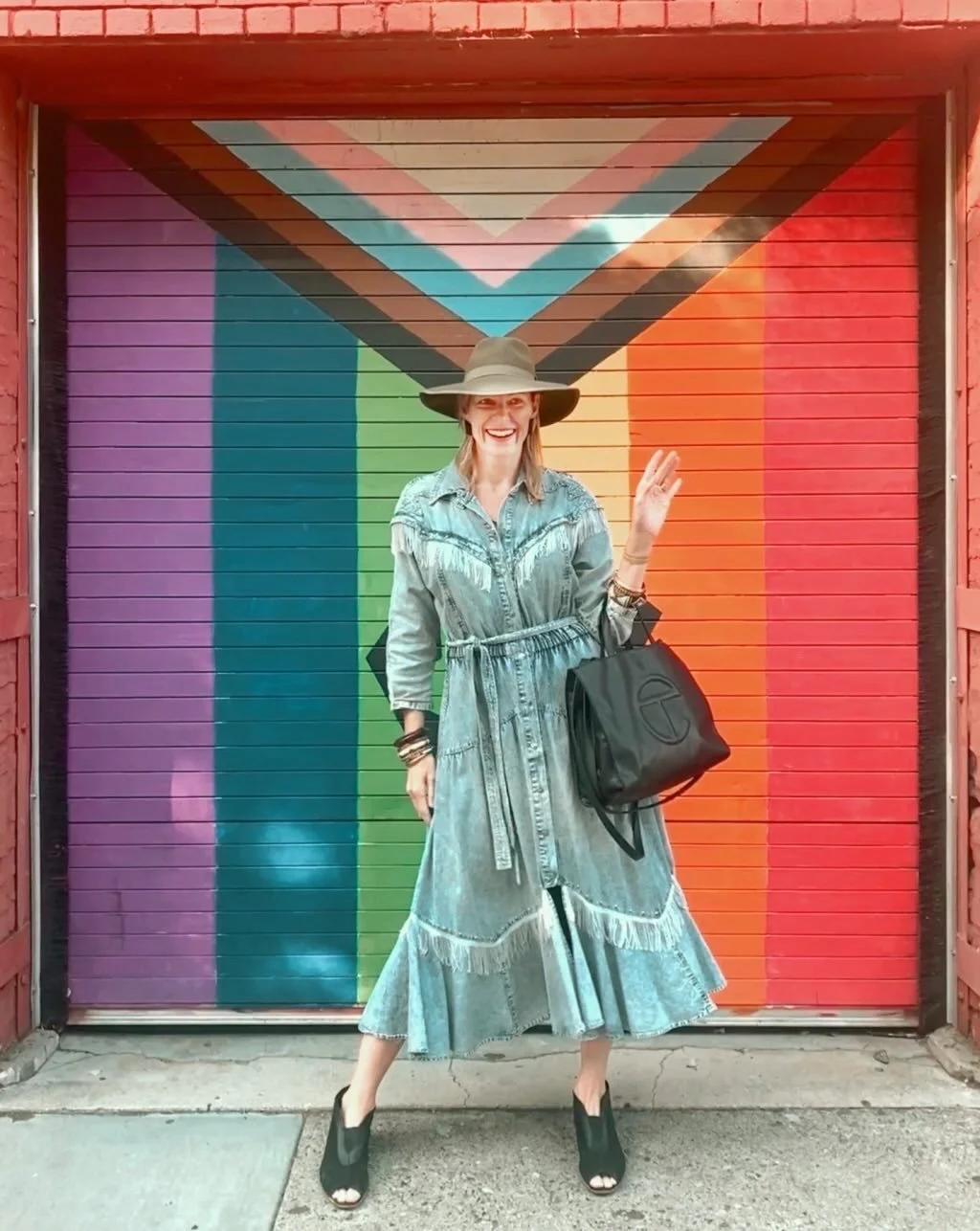Your Most Burning Money Questions Answered
“Instincts and emotions like stress, shame, fear, and other barriers that keep you from achieving your financial freedom. ”
Since 2015, Maureen Paley has helped hundreds of women navigate and achieve financial independence. She does it by demystifying the financial industry, our financial systems, and then teaches her clients the steps to take so the system benefits them.
This is a huge task. Especially because money isn’t something most women want to talk about. According to research from Wells Fargo and the Female Quotient, “Women feel less comfortable discussing finances, with over 40% stating they have a stressful relationship with money.”
But Maureen isn’t just an accredited financial counselor. She’s also a social worker. Her unique approach provides the missing link to help people with their money in a powerful and transformative way. “Emotions come up with finances. Our survival instincts kick in,” Maureen explains. Instincts and emotions like stress, shame, fear, and other barriers that keep you from achieving your financial freedom.
To help end this cycle, we asked our readers to send us their most burning questions. Then we called up Maureen.
This interview is condensed and edited for clarity.
Jen: Okay, I got to start with me. I got to frame the context here. What do you think the biggest hurdle is for people when it comes to wealth building? Actually, should we even call it wealth building or should we stick to the topic of money?
Maureen: The phrase that I use quite a bit is “financial well-being,” because our money is connected to our emotional well-being, our survival, and our ability to thrive.
Jen: So one of the things I think about is how the American system is designed to be difficult. I think there's a lot of pressure to feel like if you haven't made it, somehow it's a flaw of yours, without understanding that it’s designed actually to keep wealth in a certain amount of hands. I guess what I’m asking is about unnecessary shame. That’s an emotion that comes up a lot with money, yeah?
Maureen: Oh, yeah.That shame aspect comes up so much. A lot of our emotional life is tied into money and vice versa. You know, we have this story in America that you've got to bootstrap yourself into your circumstances and so on and so forth. And we know that there are communities that have been systematically boxed out, especially by financial institutions. That isn't something new, nor are those systems of inequity new. But I think the interesting thing about our system in the U.S. is that we have to play and swim in these waters. And what I get really excited about is helping people do that.
Jen: All right. So to prepare for our conversation, I asked our readers what questions they had about wealth and money. So I want to go through a couple of those if you're cool with it.
Maureen: Sounds good.
Jen: So the first one is, “I have so much anxiety even thinking about money, let alone talking about it. Where do I even begin? I don't even know what to ask.”
Maureen: Oh, my goodness. I feel so much for the person who asked this question. I want everybody to know it is completely normal and expected to have anxiety around money and finances because again, they’re tied into our survival, tied into our thriving, tied into our sense of self-worth.
Start by connecting with someone that you trust. It could even be a close friend. You don't have to divulge the ins and outs of your financial life, but you can start talking about how you have a lot of anxiety about it. Just knowing you have someone on your side who can listen to you, who's likely to say, “It makes me really anxious too,” is a good place to start.
It's also great to work with somebody like a financial coach or financial counselor who has your best interest in mind and can help you, in a safe and non-judgmental way, walk you through this.
Jen: Okay, this one's kind of a long one and I thought it was really good. So this is somebody who wants to hear more specifically about planning for phases of retirement. She says, “I don't hear many people talking about it, but when I first retire, it will likely mean that I'm still in good health, working on a passion project and living somewhere exotic and fun.” Ooo, I want that for her! She continues, “But at some point, with advanced age, I will need to take health care and associated costs into consideration besides long-term care insurance. How might one plan or phase in a spending plan?”
Maureen: Oh my gosh, what a wonderful question. I think what this person has brought to the table is that we're living longer. We also know that as folks who identify as women, the pay gap is still persistent. We don't make dollar for dollar as much as a male makes. So we don't have as much retirement savings. There's a retirement gap and there's a wage gap. So that's spiel number one.
Going back to this idea of phases of retirement. Some people say there's four different phases of retirement.
First is pre-retirement, ages 50 to 62. This is where you can take advantage of “catch up” periods with the IRS limits. Some people go all in and make sure that they get all the catch up contributions to their retirement plans that they can. And this is great. Personally when I look at retirement, I want to make sure that I have a lot of solidity there.
Second is early retirement, ages 62 to about 70. This is when you'll still probably have a lot of energy, work on a passion project, so on and so forth. This is also when you need to ask yourself some questions: Am I a property owner and is that property paid off? Do I have children that I need to support, especially with their education? What does that look like? The answers will affect how you approach your early retirement; how much you can save and how much you have to spend.
And then once you’re 70 to 80, you enter the third phase. Maybe you want to travel less. Maybe you want to stay closer to home and live a little bit simpler and quieter. You’re going to estimate those different expenses and consider inflation. This is where crunching numbers really does help to figure out how much you're going to need. If you're like, “I don't even know how to figure out how much I'm going to need,” there are retirement calculators.
Finally, let’s talk about 80+, which is the period of where long-term care might come in. You might have some opportunities to do a reverse mortgage on your home to provide more income.
In all of these phases, we need to think about our health care expenses. Medicare might be a good option for you. You might also want to supplement with something else.
So look at those phases and what you think you're most likely to do while understanding that it can change. For instance, you might leave the 9 to 5, 40-hour a week job, but then, after a couple of years, you might want to pick up some side work.
I would also like to take this opportunity to say none of what I offer is investment advice. I don't do that. There are people—financial planners—who are very good at what they do that you can speak with. They have a lot of tools at their disposal, like models that they pay for and use on a regular basis, where they can plug in different scenarios and help you get a sense of what they might mean dollars and cents wise.
“Some people say there’s four different phases of retirement.”
Jen: All right, here's another one. “Should I be trying to pay off my house early?”
Maureen: So my answer to that question is, do you want to pay off your house early? Let’s talk about the benefits and the drawbacks. I'm someone who believes in self-direction. So I’ll talk about facts and possibilities, and then you get to make those choices yourself.
So the main benefit of paying off your house early is that most of us finance the purchase of our home. That financing comes with an interest expense. If you decide to pay more than your defined mortgage payment per month, you are saving yourself tens of thousands, if not hundreds of thousands of dollars in interest expense over time. There's also calculators and ways to figure out your exact number.
For instance, you discover that if you do an extra $250 a month, you’re going to save yourself $90,000 in interest. That's a lot of money. Are you willing to leave that money on the table?
We also need to talk about cash flow. When I buy a home, I'm financing my wealth over time. And if I’m managing my cash flow well and that extra $250 is available to me per month, I can use it to build my wealth, my assets, my equity quicker, and I'm going to save myself that significant expense over time.
Jen: Cons?
Maureen: Cons are you may not be able to do that. Maybe you’re very comfortable with the mortgage payment as it is. You may have gotten a great interest rate that you're really not worried about. And when you crunch the numbers you see that, from a month-to-month cash flow perspective, you don't really want to pay more right now.
And the thing is, You don't have to do it right away. You can not do it for the next year, two, three, four or five years, and then you can decide to do it.You can also try paying more for 6 to 12 months and see what it feels like on the cash flow side.
Jen: Got it. Okay, so here's another one. This one's much more philosophical, I’d say. “How do you hold the energy for the life you want financially while being grateful for what you have and not spending so much time or energy wanting?”
Maureen: I love this question. Reaching, reaching, reaching, wanting, wanting, wanting can cause discomfort and suffering. But the thing is, we all do it. That's the nature of being human, right? This is part of our survival needs. Again, it's hardwired in us and there's no shame in it at all.
I think the key here is gratitude. The wanting and desire are going to bring up a certain experience, but tempering it with gratitude—and there are proven physiological benefits to gratitude—can improve our psychological health, improve our physical health, our resilience, our self esteem, our relationships.
So I’d say incorporate some type of formal gratitude practice. This could be writing in a gratitude journal. That's something I do in the mornings; not every morning, but most mornings. And it has really reshaped my everyday and helped me focus on the abundance of what's in front of me, which tempers the reaching and the pursuing and the wanting.
When we use states of being that promote our physiological well-being, strength and resilience, we are better equipped to walk through the desires and the wanting and the pursuing. Plus, we get more clear on what we want and more cognizant of where we spend our energy.
I would also argue that we’ve been taught to feel shame for some of our wants, thanks to gender conditioning. “I shouldn't want this and that I should want this.”
Jen: Oh yeah. Definitely. And again, this is all designed to keep us in a state of which we are lower so you can extract from us. So I love that you're like, No, it's okay to want things because that desire is okay. Because I always think about how we're co-creating the world that we want to live in and desire helps fuel that. We want the world to be a better place, right? Okay, final question, How do I work with you?
Maureen: I love working with people. It’s such a privilege to work one on one with people or teach classes or do speaking engagements. A good way to find me is on my site, maureen-paley.com. Connect with me and get in touch.
Jen: Thanks so much for all this. I really appreciate your time.
Maureen: This was awesome. I'm so thrilled that we got to talk.












